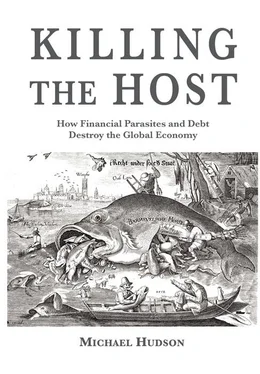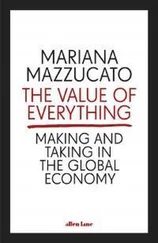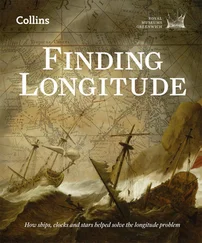I soon found that the Latin American countries I analyzed were fully “loaned up.” There were no more hard-currency inflows available to extract as interest on new loans or bond issues. In fact, there was capital flight. These countries could only pay what they already owed if their banks (or the International Monetary Fund) lent them the money to pay the rising flow of interest charges. This is how loans to sovereign governments were rolled over through the 1970s.
Their foreign debts mounted up at compound interest, an exponential growth that laid the ground for the crash that occurred in 1982 when Mexico announced that it couldn’t pay. In this respect, lending to Third World governments anticipated the real estate bubble that would crash in 2008. Except that Third World debts were written down in the 1980s (via Brady bonds), unlike mortgage debts.
My most important learning experience at Chase was to develop an accounting format to analyze the balance of payments of the U.S. oil industry. Standard Oil executives walked me through the contrast between economic statistics and reality. They explained how using “flags of convenience” in Liberia and Panama enabled them to avoid paying income taxes either in the producing or consuming countries by giving the illusion that no profits were being made. The key was “transfer pricing.” Shipping affiliates in these tax-avoidance centers bought crude oil at low prices from Near Eastern or Venezuelan branches where oil was produced. These shipping and banking centers — which had no tax on profits — then sold this oil at marked-up prices to refineries in Europe or elsewhere. The transfer prices were set high enough so as not to leave any profit to be declared.
In balance-of-payments terms, every dollar spent by the oil industry abroad was returned to the U.S. economy in only 18 months. My report was placed on the desks of every U.S. senator and congressman, and got the oil industry exempted from President Lyndon Johnson’s balance-of-payments controls imposed during the Vietnam War.
My last task at Chase dovetailed into the dollar problem. I was asked to estimate the volume of criminal savings going to Switzerland and other hideouts. The State Department had asked Chase and other banks to establish Caribbean branches to attract money from drug dealers, smugglers and their kin into dollar assets to support the dollar as foreign military outflows escalated. Congress helped by not imposing the 15 percent withholding tax on Treasury bond interest. My calculations showed that the most important factors in determining exchange rates were neither trade nor direct investment, but “errors and omissions,” a euphemism for “hot money.” Nobody is more “liquid” or “hot” than drug dealers and public officials embezzling their country’s export earnings. The U.S. Treasury and State Department sought to provide a safe haven for their takings, as a desperate means of offsetting the balance-of-payments cost of U.S. military spending.
In 1968 I extended my payments-flow analysis to cover the U.S. economy as a whole, working on a year’s project for the (now defunct) accounting firm of Arthur Andersen. My charts revealed that the U.S. payments deficit was entirely military in character throughout the 1960s. The private sector — foreign trade and investment — was exactly in balance, year after year, and “foreign aid” actually produced a dollar surplus (and was required to do so under U.S. law).
My monograph prompted an invitation to speak to the graduate economics faculty of the New School in 1969, where it turned out they needed someone to teach international trade and finance. I was offered the job immediately after my lecture. Having never taken a course in this subject at NYU, I thought teaching would be the best way to learn what academic theory had to say about it.
I quickly discovered that of all the subdisciplines of economics, international trade theory was the silliest. Gunboats and military spending make no appearance in this theorizing, nor do the all-important “errors and omissions,” capital flight, smuggling, or fictitious transfer pricing for tax avoidance. These elisions are needed to steer trade theory toward the perverse and destructive conclusion that any country can pay any amount of debt, simply by lowering wages enough to pay creditors. All that seems to be needed is sufficient devaluation (what mainly is devalued is the cost of local labor), or lowering wages by labor market “reforms” and austerity programs. This theory has been proved false everywhere it has been applied, but it remains the essence of IMF orthodoxy.
Academic monetary theory is even worse. Milton Friedman’s “Chicago School” relates the money supply only to commodity prices and wages, not to asset prices for real estate, stocks and bonds. It pretends that money and credit are lent to business for investment in capital goods and new hiring, not to buy real estate, stocks and bonds. There is little attempt to take into account the debt service that must be paid on this credit, diverting spending away from consumer goods and tangible capital goods. So I found academic theory to be the reverse of how the world actually works. None of my professors had enough real-world experience in banking or Wall Street to notice.
I spent three years at the New School developing an analysis of why the global economy is polarizing rather than converging. I found that “mercantilist” economic theories already in the 18 thcentury were ahead of today’s mainstream in many ways. I also saw how much more clearly early economists recognized the problems of governments (or others) relying on creditors for policy advice. As Adam Smith explained,
a creditor of the public, considered merely as such, has no interest in the good condition of any particular portion of land, or in the good management of any particular portion of capital stock. … He has no inspection of it. He can have no care about it. Its ruin may in some cases be unknown to him, and cannot directly affect him.
The bondholders’ interest is solely to extricate as much as they can as quickly as possible with little concern for the social devastation they cause. Yet they have managed to sell the idea that sovereign nations as well as individuals have a moral obligation to pay debts, even to act on behalf of creditors instead of their domestic populations.
My warning that Third World countries would not to be able to pay their debts disturbed the department’s chairman, Robert Heilbroner. Finding the idea unthinkable, he complained that my emphasis on financial overhead was distracting students from the key form of exploitation: that of wage labor by its employers. Not even the Marxist teachers he hired paid much attention to interest, debt or rent extraction.
I found a similar left-wing aversion to dealing with debt problems when I was invited to meetings at the Institute for Policy Studies in Washington. When I expressed my interest in preparing the ground for cancellation of Third World debts, IPS co-director Marcus Raskin said that he thought this was too far off the wall for them to back. (It took another decade, until 1982, for Mexico to trigger the Latin American “debt bomb” by announcing its above-noted inability to pay.)
In 1972 I published my first major book, Super Imperialism: The Economic Strategy of American Empire , explaining how taking the U.S. dollar off gold in 1971 left only U.S. Treasury debt as the basis for global reserves. The balance-of-payments deficit stemming from foreign military spending pumped dollars abroad. These ended up in the hands of central banks that recycled them to the United States by buying Treasury securities — which in turn financed the domestic budget deficit. This gives the U.S. economy a unique free financial ride. It is able to self-finance its deficits seemingly ad infinitum . The balance-of-payments deficit actually ended up financing the domestic budget deficit for many years. The post-gold international financial system obliged foreign countries to finance U.S. military spending, whether or not they supported it.
Читать дальше












